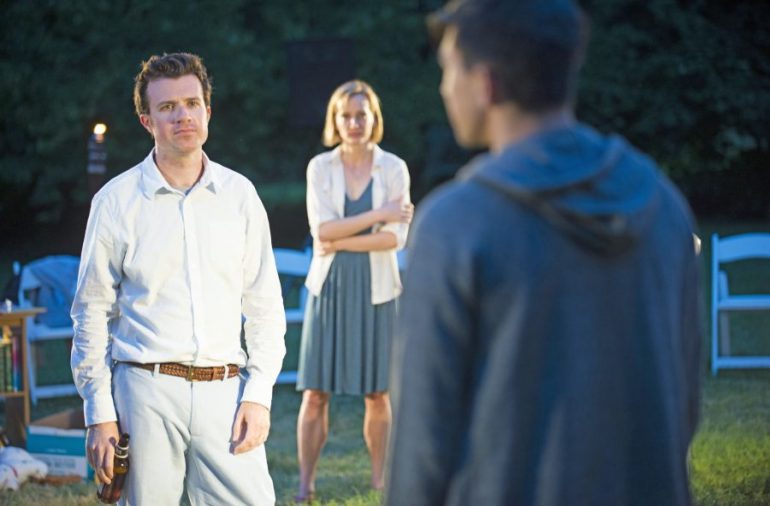
Rabbit Hole by David Lindsay-Abaire. Theater With a View, Pottstown PA, through July 29, 2017.
Rabbit Hole is a provocative family drama about differing ways in which people deal with the death of a child. How would you handle your four-year-old being accidentally struck and killed by a motorist? Clearly, there’s no correct answer and no two people will behave similarly.
In David Lindsay-Abaire’s play, mother Becca tries to block from view all reminders of her son Danny, while father Howie wants to hold on to objects. He replays a family video of the laughing child while she packs the boy’s clothing to donate to Goodwill and urges her husband to sell their house.
At its premiere in 2006, many critics found the play to be insightful and it won a Pulitzer Prize for drama. Cynthia Nixon won a Tony Award for her portrayal of Becca, and Nicole Kidman starred in a movie version.
The subject is gripping and the script is carefully constructed. The idea that this situation could occur in any person’s home is magnified by this production which was performed in the backyard of Sycamore Hill estate, a sprawling home in a rural part of Montgomery County, Pennsylvania. This is the base for Theater With a View, an Equity company that specializes in outdoor summer productions. The audience sits in a single circle of chairs and the action is within that ring.
In Mel Brooks’s The Producers, Max Bialistock boasted, “You’ve heard of theater-in-the-round? I’m the man who invented theater-in-the-square.” Actually, theater-in-the-round was pioneered at Lambertville Music Tent in Bucks County and Valley Forge Music Fair in Devon which is only a few miles from this company’s venue. Those theaters were in sloping bowls that provided sightlines for multiple rows of seats, under tents. Performers made their entrances by running down aisles to the central stage. The Rabbit Hole actors sit down in chairs next to audience members when they’re not in a scene.
The ground is level, covered by natural grass. Dialogue is conversational, without amplification, and daylight is sufficient during most of the play’s two-hour length. All of this allows the audience to believe it is party to real events.
The grieving mother (Nina Covalesky) and father (Drew Seltzer) snap at each other and their marital relations are strained under the pressure of the tragedy. Covalesky was engaging as Becca, keeping in mind that the role justifiably can be played in varying ways. Cynthia Nixon was brittle and on-edge, exceedingly judgmental of others; Covalesky was more polite and smiled frequently. As she put up with her sister’s revelation of punching another woman in a bar and being impregnated by that woman’s boyfriend, Covalesky kept her resentment cautiously under wraps.
This made her a sympathetic figure but muted some of the conflict in this drama. Seltzer, too, retained calmness during most of the play. His one explosion should have come after a relentless progression of his exasperation. Perhaps the director, Seth Reich, advised these low-key interpretations because of the intimacy of this setting.
Jo Twiss was deliciously acidic as Becca’s mother who also lost a son (albeit in his twenties, and to drugs), and she supplied welcome humor. Jessica Myhr was appealing as Becca’s kid sister Izzy and Connor Johnston was amiable as the teenage driver Jason, who arrives to try to make amends.
Visit theaterwithaview.com.